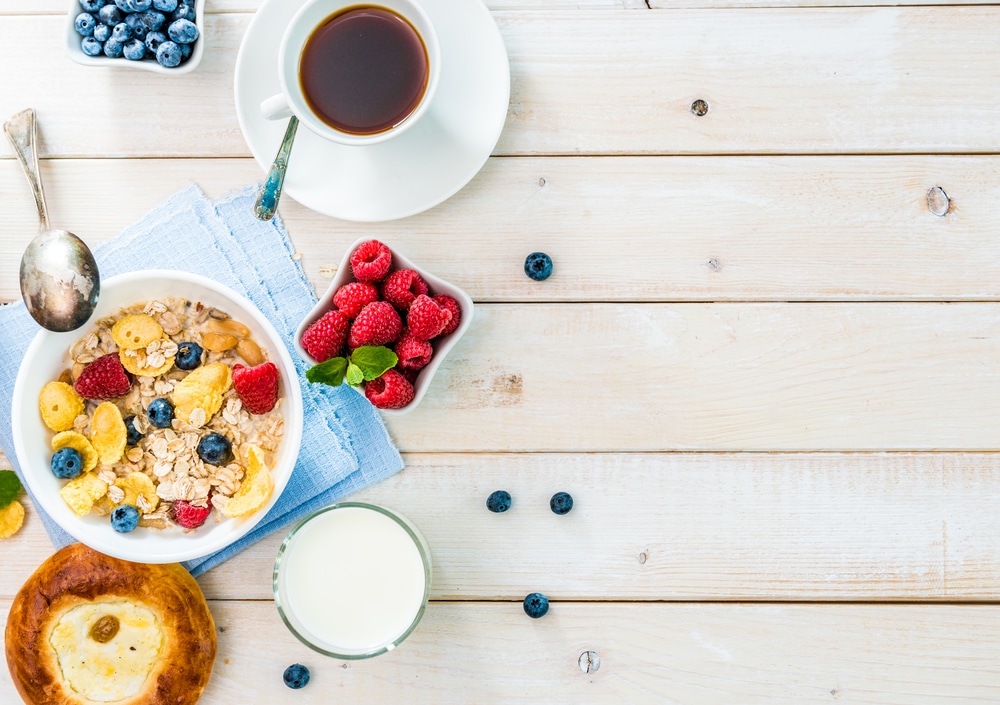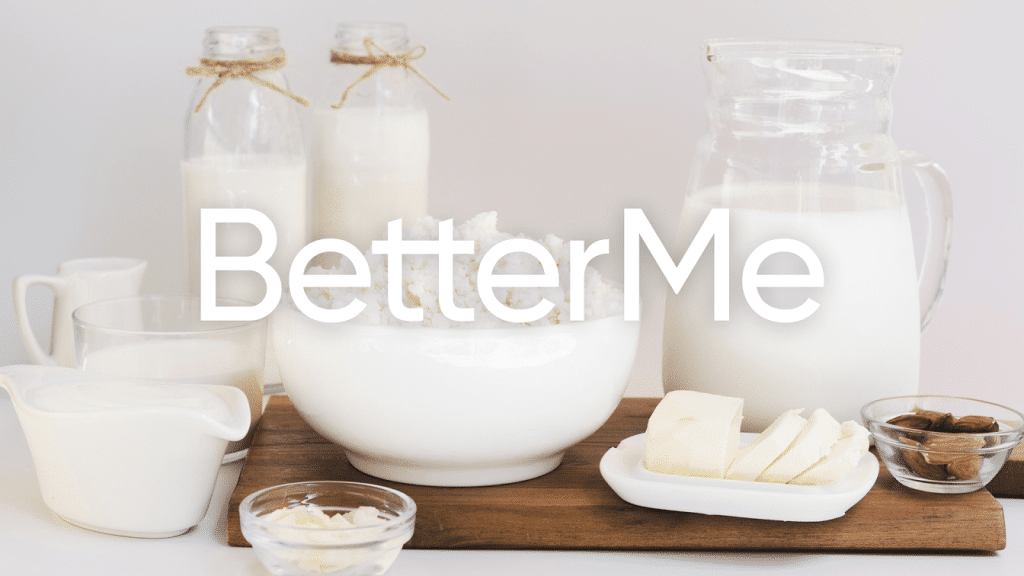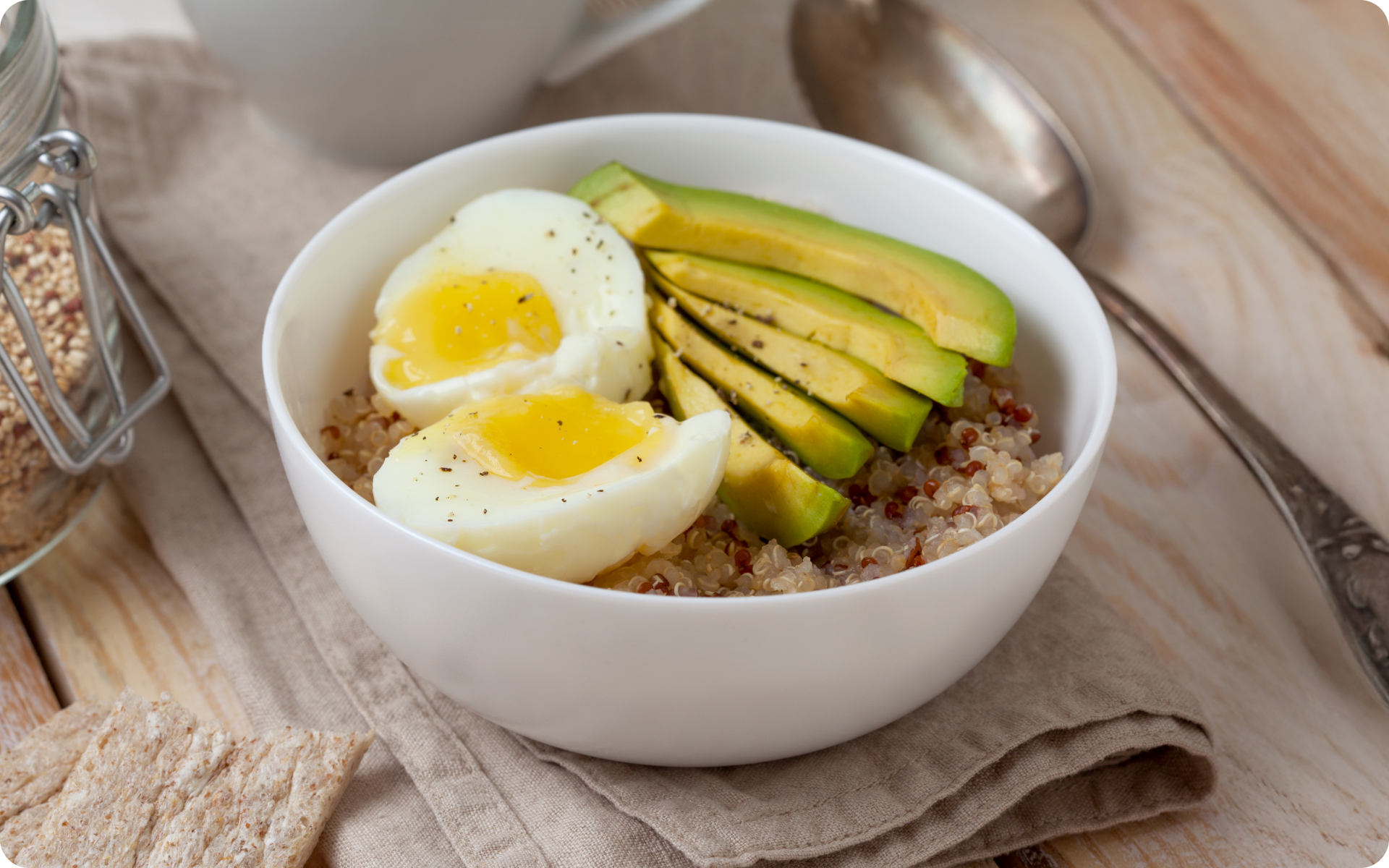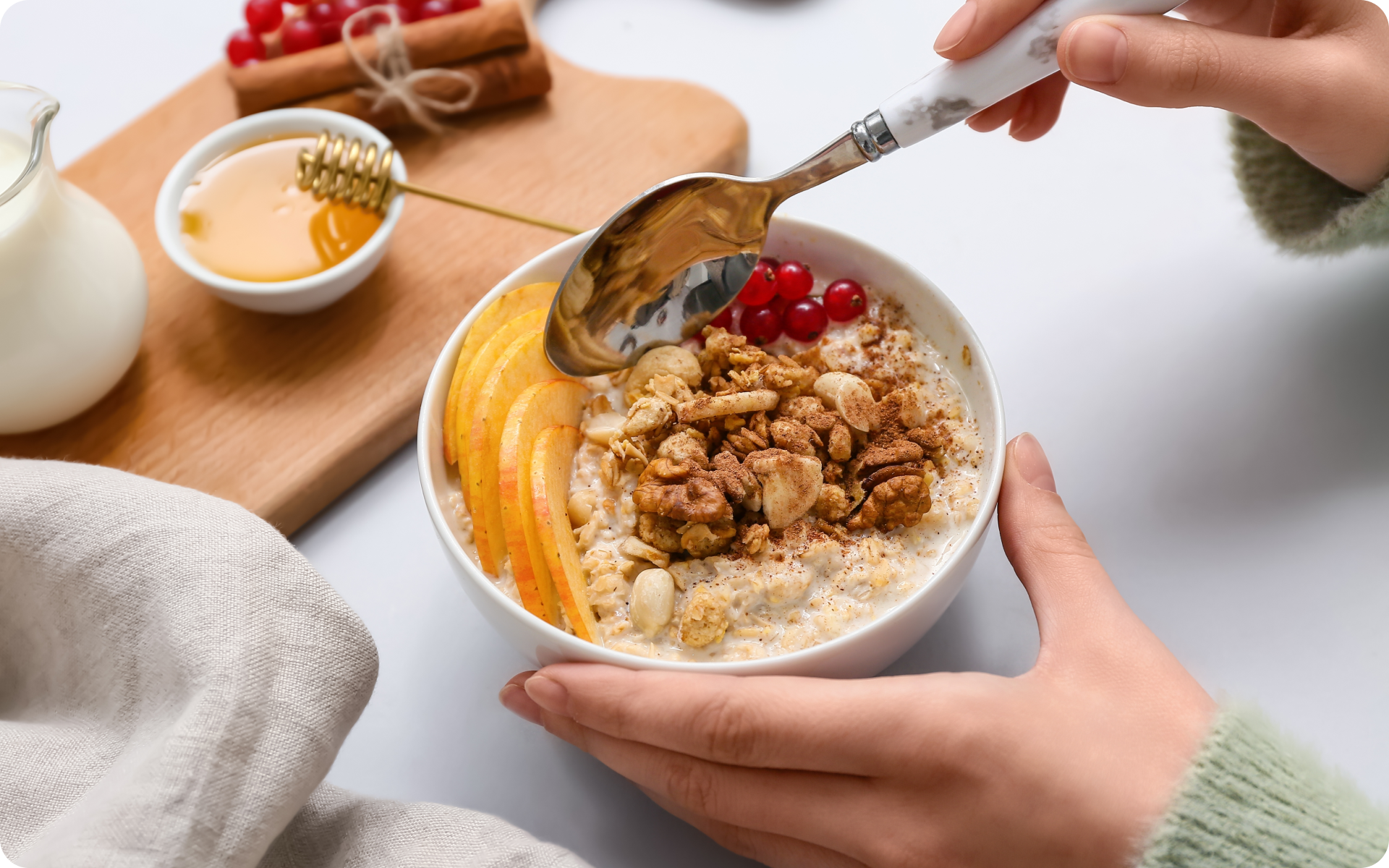Do you get up, get ready, and grab a coffee on your way out of the house? Perhaps you’re more fond of nibbling on a Rice Krispy because you’re too busy getting the kids ready for school to eat breakfast. Or, maybe, you’re a teenager who is more interested in catching up with friends over a couple of donuts and a juice at the local cafe. There are several different reasons why people might skip their morning meal, but according to nutritionists, “breakfast skippers” may be missing out on the most important meal of the day. Let’s look at some of the benefits of a balanced, nutrient-packed breakfast and the importance of breakfast.
The Importance Of Breakfast: What Does Breakfast Do For You?
Many people are aware that breakfast is important, but the actual reasons for this may not be all that evident. Just what are some of the benefits of including a morning meal?
Weight Management
If you’ve tried to lose weight before, you’ve probably tried a fad diet or two. Perhaps you have even gone to the gym for a while. But did you know that eating breakfast could help you lose weight?
There is some evidence from observational studies that eating breakfast is associated with lower body weight. However, a causal relationship has not yet been established (14).
Although the exact mechanism of the relationship is not understood, it is believed that a healthy breakfast may have a positive effect on levels of the hunger-regulating hormone leptin (14).
Leptin has been found to affect appetite, metabolism, and energy expenditure by modulating neuropeptides involved in hunger signaling pathways.
In other words, leptin is known to decrease feelings of hunger. Studies show that overweight individuals tend to have higher levels of leptin, possibly suggesting a resistance to its effects, which might result in them feeling less satisfied after eating (9).
Consuming a healthy breakfast may help balance these feelings, making it easier for someone who wants to lose weight to stick with their diet plan.
Much Needed Energy Boost
When you wake up, your “fuel tank” is empty. All the food you ate at night is gone and you need a quick energy boost before your morning commute. In fact, most of us don’t even get to work before we’ve already burned through the majority of our glycogen stores from the day before.
This is why many people eat cereal or other breakfast food in the morning– they’re looking for a source of fast energy! The problem with quick sources of energy, however, is that they are often not sustainable. The initial high is short-lived and you will soon crash, leaving you hungry again (12).
A slow-burning carbohydrate, such as whole grains, provides a balanced source of energy that won’t leave your blood sugar levels spiking and crashing throughout the day. This means less hunger and more stable moods (and better focus in the office!) (12).
Read More: High Fiber Cereal: How To Choose The Right Food To Eat For Breakfast
The Importance Of Breakfast: Improved Concentration
Many parents know this all too well– kids who eat breakfast tend to do better in school.
Not only are children who have recently eaten likely to be more attentive, but they’re also less likely to experience the negative side effects of being hungry.
This can mean anything from struggling with their own personal problems (“I just don’t get the Math. I don’t think it’s for me!”) to acting out in the classroom (“I don’t know why you’re making us do this. It’s dumb. Just look at my friend over there! She doesn’t HAVE to do this!”).
Eating breakfast in the morning can help improve your attention span and may even help you score higher on those pesky midterms or finals.
For those of you who work and commute, breakfast will help improve your memory function as well. Studies show that people who eat breakfast perform better at tasks that involve remembering and processing information (3).
Improved Heart Health
A systematic review recently found that people without known cardiovascular disease at baseline who skipped breakfast were more likely to experience incident cardiovascular disease over the following years and more likely to die from it than those who ate breakfast regularly (13).
Early risers may have an even healthier heart, as those who eat breakfast have been found to be less likely to develop metabolic syndrome– a set of risk factors that are associated with more serious heart problems, stroke, and diabetes (13).
Having a whole grain breakfast (oats, quinoa, etc.) will help stabilize your blood sugar levels and keep your insulin at optimal levels. High blood sugar in people with diabetes is a risk factor for heart disease. The fiber in whole grains also helps lower LDL (“bad”) cholesterol and manage weight, both of which can help lower cardiovascular diseases risk.
Additionally, whole grains contain antioxidants that will help repair and prevent any damage done to the cells of your cardiovascular system. These antioxidants can help lower cholesterol and reduce the risk of heart disease (11).
The Importance Of Breakfast: Lower Risk Of Diabetes
Type 2 diabetes is a serious disease that requires lifelong treatment and can be fatal if left untreated. It’s also on the rise, as more and more people are becoming obese from poor eating habits.
Studies have shown that those who eat breakfast regularly might have a lower risk of developing type 2 diabetes. This may be because eating a morning meal stabilizes blood sugar levels, which lowers the chance of becoming insulin resistant (6).
For best results, make sure to eat a healthy whole grain breakfast! A breakfast high in simple carbohydrates – think sugary cereals or sweet pastries – might be just as bad for you as not eating at all. You might get that quick energy boost now, but your body will fall into a slump soon after.
Breakfast Foods Are Rich In Essential Vitamins, Minerals, And Nutrients
Folate, calcium, potassium, and magnesium are just a few of the vitamins and minerals found in healthy breakfast foods. These nutrients support your body’s every function, but many people aren’t getting enough of them through their diet.
Starting your day with a bowl of cereal topped with fresh fruit or an omelet with whole-grain toast is an excellent way to ensure you’re getting all the vitamins your body needs. You’re more likely to meet your recommended daily allowance (RDA) of these nutrients when you start the day with a nutrient-rich and balanced breakfast.
If you follow a vegetarian diet, you’re likely not getting the necessary amount of vitamin B12. This is because this essential nutrient is generally found in animal products such as milk and eggs, try adding one of these to your morning meal to reap all its benefits.
Looking for a way to break the vicious cycle of weight loss and tone up all the jiggly parts? Watch the extra pounds fly off and your muscles firm up with the BetterMe app!
The Importance Of Breakfast: What Are The Best Breakfast Foods?
Skipping breakfast is bad, but eating junk for breakfast is even worse!
Here’s a list of some nutritious and delicious foods that will give you the energy and nutrients you need to start your day:
Whole Grains
There are a few reasons why whole grains should feature on your breakfast plate; these reasons include (11):
- Whole grains slow digestion, keeping blood sugar levels stable and providing a longer-lasting energy boost.
- Whole grains offer plenty of health benefits, including high concentrations of vitamins and minerals. This means your body will be better at fighting diseases and repairing damages done to cells throughout the day before.
- The fiber found in whole grains can help lower cholesterol levels and manage your weight.
- Your gut will thank you! Whole grains help regulate bowel movements and can help treat constipation.
Some great whole-grain breakfast foods include:
- Oats
- Quinoa
- Brown rice
- Millet
- Whole grain bread
High-Quality Protein
Protein is a must-have for breakfast for several reasons (10):
- Protein helps repair cells and tissues, which means your body will function at its best!
- Studies have shown that eating protein for breakfast makes you feel more full throughout the day. This is because protein curbs hunger hormones.
- Plant-based protein may help lower cholesterol and blood pressure which can lead to a healthier heart.
Some delicious high-protein foods include:
- Eggs
- Greek yogurt
- Milk
- Cheese
- Beans and legumes
- Seeds and nuts
Read More: PCOS Breakfast: The Ultimate Cheat Sheet For Women With This Condition
Fresh Fruits And Veggies
When you think of breakfast foods, fruit and veggies probably aren’t the first things that come to mind. However, they’re just as important as whole grains and quality proteins!
Fruits contain essential vitamins such as vitamin C and folate. They also provide a boost of fiber to help your digestive system run smoothly (7).
Veggies contain essential vitamins, minerals, antioxidants, and nutrients that support good health in countless ways.
Some great choices include:
- Asparagus
- Artichokes
- Brussel sprouts
- Kale
- Tropical fruits, e.g. bananas
- Citrus fruits, e.g. oranges
- Bell peppers
- Berries
Healthy Fats
Contrary to popular belief, you shouldn’t avoid all fats. There are some that are good for you.
Healthy fats lower bad cholesterol, which can reduce your risk for heart disease and stroke. One study also found that women who regularly ate foods containing monounsaturated fatty acids (MUFA), such as olive oil, or foods containing polyunsaturated fatty acids (PUFA), such as walnuts and flaxseed, had a lower risk of developing heart disease (1).
So, what are some great breakfast foods with healthy fats? Some great options include:
- Avocado
- Nuts, e.g. almonds
- Seeds, e.g. pumpkin seeds
- Nut butter
- Oily fish like salmon
Hydration
Breakfast is a good time to start hydrating. Plus, food always goes down better when you have a beverage. Your choice of breakfast beverage depends on your preference, but some choices are healthier than others.
Water
Water is the healthiest breakfast beverage option because it’s calorie-free and essential to keep your body well hydrated. Plus, drinking water first thing in the morning helps you feel full, which may help reduce snacking later in the day.
If you tend to let yourself off the hook, raise the white flag when things get tougher than you expected, send yourself on an unconscious binge-eating trip – BetterMe app is here to help you leave all of these sabotaging habits in the past!
Green Tea
Green tea is packed with antioxidants that support good health in numerous ways. They may help combat cell damage, lower cholesterol levels, and protect your skin from environmental stressors that cause wrinkles (2).
Coconut Water
Packed with electrolytes to keep you hydrated throughout the day. This can be especially helpful for athletes who need some extra electrolytes after strenuous activity.
Coffee
Coffee not only helps you wake up in the morning, but it also gives you an energy boost.
Studies have shown the benefits of drinking coffee include (5):
- Increased energy
- Better concentration
- Heightened metabolism
- Improved mood
Caffeine is the main ingredient in coffee that provides all these benefits. It triggers the release of neurotransmitters, which are chemicals your brain uses for communication. One neurotransmitter caffeine releases dopamine, which boosts your mood and makes you feel good.
However, coffee does have a downside too! Studies have found that drinking too much caffeine can do more harm than good (4), such as causing:
- High blood pressure
- Irregular heartbeat
- Anxiety and irritability
- Jitteriness and shakiness
To keep these negative effects in check, limit your daily coffee intake to no more than four cups. If you are pregnant or breastfeeding, talk to your doctor about caffeine intake.
Milk
Plain old milk is a great breakfast beverage. It’s tasty, packed with calcium that your body needs to build strong bones, and contains vitamin D that ensures your body absorbs calcium (8).
There are lots of options when it comes to milk besides regular cow’s milk. Some examples include:
- Soy milk
- Almond milk
- Cashew milk
It’s important to note that some people should avoid drinking milk, such as those who are lactose intolerant or have a dairy allergy.
Smoothies
A fruit and vegetable smoothie with added protein powder is a nutritious way to start your day. Plus, drinking a smoothie for breakfast is an easy way to get in some extra fruit and veggies throughout the day.
Here are some great ingredients you can add to your smoothie:
- Bananas
- Avocados
- Nuts, e.g. almonds
- Seeds, e.g. sunflower seeds
- Nut butter
- Coconut oil and coconut milk
- Leafy greens, e.g. kale or spinach
- Berries, e.g. blueberries or blackberries
- Cocoa powder
The Importance Of Breakfast: How To Make Time For Breakfast Every Day?
Long commutes and bust morning schedules make it tough for many people to eat breakfast.
To make sure you’re getting the most out of your morning meal, try these simple tips:
- Meal prep. Prepare breakfast foods for the week on Sunday, so you have healthy options available.
- Plan ahead. Pack your breakfast the night before, so it’s ready to grab in the morning.
- Keep it simple. If you’re pressed for time in the mornings, stick with foods that only take a few minutes to prepare or eat on the go.
- Keep breakfast staples stocked. To save yourself from unnecessary trips to the store, keep your favorite breakfast foods on hand at all times.
- Quit time-wasting morning habits. Think you don’t have time for breakfast? Watching TV, scrolling through social media feeds, and checking your email are all activities that can easily be done at night. When you wake up, eliminate these time-sucks so you can focus on preparing for the day ahead.
What If You Can’t Stomach Food In The Morning?
Some people just can’t tolerate a big meal first thing in the morning, and that’s okay. If you’re not hungry when you wake up, don’t force yourself to eat. Instead, sip on a nutritious beverage while getting ready for your day and have a midmorning snack later on.
You might also try:
- Eating lighter dinners so that you’re hungry in the morning
- Having breakfast a little later in the day
- Trying some new recipes you might like
The Bottom Line
The importance of breakfast is clear. Eating this important meal first thing in the morning gives you the energy to perform at your best, keeps you feeling full throughout the day, and provides valuable nutrients.
So, regardless of how busy or tired you are in the morning, make time to eat breakfast. With careful planning, it’s easy to create a healthy breakfast routine that works for your schedule and preferences.
DISCLAIMER:
This article is intended for general informational purposes only and does not serve to address individual circumstances. It is not a substitute for professional advice or help and should not be relied on for making any kind of decision-making. Any action taken as a direct or indirect result of the information in this article is entirely at your own risk and is your sole responsibility.
BetterMe, its content staff, and its medical advisors accept no responsibility for inaccuracies, errors, misstatements, inconsistencies, or omissions and specifically disclaim any liability, loss or risk, personal, professional or otherwise, which may be incurred as a consequence, directly or indirectly, of the use and/or application of any content.
You should always seek the advice of your physician or other qualified health provider with any questions you may have regarding a medical condition or your specific situation. Never disregard professional medical advice or delay seeking it because of BetterMe content. If you suspect or think you may have a medical emergency, call your doctor.
SOURCES:
- A healthy approach to dietary fats: understanding the science and taking action to reduce consumer confusion (2017, nih.gov)
- Beneficial effects of green tea: A literature review (2010, nih.gov)
- Breakfast eating habit and its influence on attention-concentration, immediate memory and school achievement (2008, pubmed.gov)
- Caffeine (2021, medlineplus.gov)
- Coffee (n.d., harvard.edu)
- Eating before 8:30a.m. could reduce risk factors for type 2 diabetes (2021, endocrine.org)
- Health Benefits of Fruits and Vegetables (2012, nih.gov)
- Milk and dairy products: good or bad for human health? An assessment of the totality of scientific evidence (2016, nih.gov)
- Physiology of leptin: energy homeostasis, neuroendocrine function and metabolism (2014, nih.gov)
- Protein (n.d., harvard.edu)
- Putting the Whole Grain Puzzle Together: Health Benefits Associated with Whole Grains – Summary of American Society for Nutrition 2010 Satellite Symposium (2011, nih.gov)
- Simple vs. Complex Carbohydrate Dietary Patterns and the Global Overweight and Obesity Pandemic (2017, nih.gov)
- Skipping Breakfast and the Risk of Cardiovascular Disease and Death: A Systematic Review of Prospective Cohort Studies in Primary Prevention Settings (2019, nih.gov)
- The effectiveness of breakfast recommendations on weight loss: a randomized controlled trial (2014, nih.gov)















